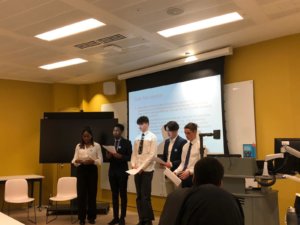-
About CH
Overview
School Life
- Admissions
- Support Us
- Facilities to Hire
- Useful Links
- Contact us
A team of nine talented Christ’s Hospital philosophers were victorious for the second year in succession at the South East Regional round of the Ethics Cup (formerly the John Stuart Mill Cup), kindly hosted by volunteers at King’s College London. As a result, the team progress to the National Finals which will take place at the end of May, in St Andrews.

This year CH was one of 12 schools to meet in person at Bush House and grapple with important ethical problems such as the right to bear arms and the morality of a ban on short-haul domestic flights. The Ethics Cup is not a debating competition – opposing teams are encouraged to work together to get to the truth of the matter, rather than dogmatically defend a single point of view. The Christ’s Hospital team were praised by the judges and other schools for their team spirit, clarity of presentation, probing questions, and incisive argumentation.
Their first match was against Caterham School who put forward a case arguing that digital resurrection (recreating deceased actors on screen using CGI) is unethical. Rowan, Charlie, David, and Kit offered a clear and concise commentary that helped Caterham to develop and clarify their position in relation to the aesthetic freedom of filmmakers and the rights of the dead. CH followed up with their own presentation defending the freedom of parents to circumcise their newborn sons, based on the harm that can be caused by social ostracisation. They responded effectively to Caterham’s questions and an intense grilling from the judges. Although the judges’ vote was tied (1.5-1.5) CH claimed victory on the number of points awarded in the judges’ assessment.
To progress, CH had to win their next match. Amen, Gabriel, Ben, Will, and Toga stepped up to face Ark Globe Academy, who had beaten Caterham 3-0 in their previous round. Ark Globe began by defending the ethics of a youth quota in the UK parliament, suggesting that a minimum of 20% of parliamentarians should be under the age of 30. They defended this proposition with a well-reasoned case, with equity and equality at the conceptual centre, and took into account significant objections. CH gave a wonderfully effective commentary that challenged Ark Globe to commit to further quotas for other underrepresented groups, as well as introducing the possibility of more effective alternatives. They then followed up with their own presentation, condemning antinatalism (the view that it is morally wrong to reproduce) as unethical. Their case hung on an Aristotelian view of value, in which life’s struggles may cause suffering, but have moral value insofar as they enable you to develop virtues, character traits of moral worth. This approach paid off, and CH progressed to the semi-finals with a 3-0 victory over Ark Globe.
In the first knockout round we faced West Sussex friends and rivals, Worth School. CH opened with a defence of representative democracy against the proposed alternative – democracy by lot, in which parliamentarians would be selected at random from the population. They responded confidently to questions raised by Worth and the judges which centred on their understanding of the qualities that are required in our leaders (is there a difference between a ‘distinguished’ or ’upstanding’ individual?). Worth then presented on the controversy that developed around the outfit regulations in women’s beach handball after the Norwegian team were fined after refusing to wear the required bikini bottoms, in favour of shorts. Worth put forward a balanced and persuasive case that players in a sport should agree on the sporting regulations by vote. CH picked up on many of the finer points in Worth’s case, questioning the applicability of some of the examples used, which put their opponents under some pressure, especially after the judges echoed these themes in their own questions. After some deliberation the judges ruled in favour of CH, 3-0, putting us through to the final. Worth went on to claim victory in the third-place playoff, meaning we may meet them again at the finals in St Andrews.
With emotions running high, we sat down opposite the team from Simon Langton Girls’ Grammar School, last year’s national champions, in a rematch of last year’s regional final. SLGGS defended means-tested income support against universal basic income as the more equitable and practical policy choice. CH critiqued SLGGS’s approach to equity, equality, and fairness in a hard-hitting commentary speech which also managed to highlight the strengths present in the presentation. SLGGS demonstrated real open-mindedness and reflectiveness in their responses and in their discussion with the judges and CH knew they had to give their all as their time to present arrived.
The final discussion was the ethical dilemma around the plastic straw ban, which causes some serious issues for disabled people who rely on the ready availability of plastic straws. CH advocated in favour of the ban but softened this with the suggestion of an opt-in system, so that straws could be made available upon request. They argued that this would mitigate the issues for disabled people while maintaining the overall environmental benefits. SLGGS challenged CH over whether they felt this was a good use of government authority, or whether it set a dangerous precedent, and also on the futility of bringing in measures such as these which are largely symbolic when other policies can have a much greater impact. The CH team handled these queries with great skill, incorporating some of their opponents’ proposals and demonstrating the philosophical virtues of the competition. Thus, they deservedly came away with the overall victory in an incredibly high-scoring final, winning 3-0 in judges votes with an overall score of 172/180 points.
The team thoroughly enjoyed themselves and are looking forward to the finals in Scotland where they will meet Worth and SLGGS again, in addition to the best teams from around the UK.